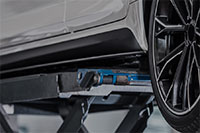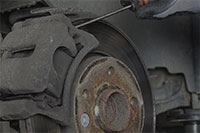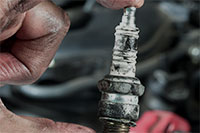How often to change oil?
Everything you need to know about the oil and filter change for your vehicle
Are you uncertain about changing your vehicle's oil and filter? Do you worry about making mistakes or causing damage to your engine? We're here to share our expertise and help you make the best decision for your needs.
At Partly Dave's Garage, we've been changing oil and keeping cars in good shape for more than 40 years. Our goal is to help you make sure your engine lasts as long as possible, avoid making mistakes that will cost you money, and protect the environment.
In this article, you'll learn everything you need to know about oil and filter changes, including how often to change your oil and filter, the benefits of using synthetic oil, how to choose the right oil viscosity, signs that your oil or filter needs to be changed, common mistakes to avoid, and how to recycle used oil and oil filters in an environmentally friendly way.
Let's dive in.
- How often should you change your oil and oil filter?
- How to choose the right oil viscosity for your vehicle
- Signs that your oil or oil filter needs to be changed
- The benefits of using synthetic oil over conventional oil
- The role of oil filters in engine performance and longevity
- The importance of using quality oil and oil filters in your vehicle
- DIY or Mechanic Shop?
- Common mistakes to avoid when changing your oil and oil filter
- The impact of driving habits and climate on oil and filter lifespan
- How to recycle used oil and oil filters in an environmentally-friendly way
How often should you change your oil and oil filter?
The frequency with which you should change your vehicle's oil and oil filter depends on several factors, including the make and model of the vehicle, the type of oil used, and the driver's driving habits. In general, most vehicles require an oil change every 5,000 to 8,000 kilometers or every six months, whichever comes first. However, some manufacturers recommend longer intervals between oil changes, such as 15,000 kilometers.
It's important to consult your vehicle's owner's manual for specific oil change recommendations and to follow a regular maintenance schedule to keep your vehicle running smoothly. You should also check the color and consistency of the oil on a regular basis. If the oil is dark and dirty or the level is low, it may be time to change the oil and oil filter sooner than the recommended interval.
By changing your oil and oil filter on a regular basis, you can prevent damage to your engine and prolong the life of your vehicle.
How to choose the right oil viscosity for your vehicle
Choosing the right oil viscosity for your vehicle is important to ensure optimal engine performance and longevity. The recommended viscosity will depend on a number of things, such as the make and model of your car, the weather where you live, and how you drive.
Viscosity refers to the oil's resistance to flowing at a certain temperature. The viscosity rating is typically displayed on the oil container as a combination of two numbers, such as 5W-30 or 10W-40. The first number (before the "W" for winter) indicates the oil's viscosity in cold temperatures, while the second number represents the viscosity at normal operating temperature.
The owner's manual will typically provide a range of viscosity options that are suitable for your vehicle based on the make and model and the expected operating conditions.
When selecting the viscosity of the oil, consider the climate in which you will be driving. In colder climates, a lower first number (such as 5W) is recommended to ensure easy cold weather starting and adequate oil flow. In warmer climates, a higher second number (such as 40) may be recommended to provide sufficient engine protection at higher temperatures.
It's also important to consider your driving habits when choosing oil viscosity. If you regularly drive in stop-and-go traffic or haul heavy loads, a higher viscosity oil may be recommended to ensure proper engine protection. However, if you drive mostly on the highway and in milder temperatures, a lower viscosity oil may be sufficient.
Overall, choosing the right oil viscosity for your vehicle is critical to ensuring optimal engine performance and longevity. Consult your owner's manual and consider your driving habits and climate to make an informed decision about the best viscosity rating for your vehicle.
Signs that your oil or oil filter needs to be changed
Regular oil changes and oil filter replacements are essential to keep your vehicle running smoothly and prevent costly engine damage. It's important to be aware of the signs that your oil or oil filter needs to be changed, so you can address these issues promptly and avoid any long-term damage.
Here are some common signs that your oil or oil filter needs to be changed:
- Dark, dirty oil: If your oil is dark and dirty, it's likely time for a change. As oil ages and accumulates impurities, it becomes less effective at lubricating and protecting the engine.
- Engine warning light: If your vehicle's check engine light comes on, it could indicate a problem with the oil or oil filter. Have your vehicle inspected by a professional mechanic to determine the cause of the warning light.
- Loud engine noise: If your engine is making unusual noises, such as knocking or tapping, it could be a sign that the oil is old or dirty, and it's not lubricating the engine components effectively.
- Low oil level: If your oil level is consistently low, it may be due to leaks or burning oil. Check your oil level regularly to catch these issues early and prevent further damage to the engine.
- Poor fuel economy: If you notice a decrease in your vehicle's fuel economy, it could be a sign that the oil or oil filter needs to be changed. Old or dirty oil can cause the engine to work harder, reducing fuel efficiency.
- Exhaust smoke: If you notice smoke coming from your exhaust, it could indicate an oil or oil filter problem. Blue smoke is a sign that oil is being burned in the engine, while black smoke indicates an overly rich fuel mixture.
If you notice any of these signs, it's important to have your oil and oil filter changed as soon as possible. By taking care of these problems right away, you can keep the engine from getting worse and make sure your car runs well for years to come.
The benefits of using synthetic oil over conventional oil
- Better performance in extreme temperatures: Synthetic oil performs better in both high and low temperatures, making it a great option for drivers in hot or cold climates. It flows more easily in cold temperatures, providing better startup protection, and maintains its stability at high temperatures, offering better protection against engine wear.
- Improved engine protection: Synthetic oil is formulated to provide better protection against engine wear, reducing the risk of damage to vital engine components. It also contains fewer impurities and additives, which can help to keep engines cleaner and extend their lifespan.
- Longer oil change intervals: Synthetic oil lasts longer than conventional oil. This means drivers can save time and money on oil changes in the long run.
- Improved fuel efficiency: Synthetic oil can help improve fuel efficiency by reducing friction and drag on the engine. This can result in better gas mileage and lower emissions.
- Better for the environment: Synthetic oil is often more environmentally friendly than conventional oil, as it produces fewer emissions and requires less oil changes, reducing the amount of oil waste generated.
Overall, synthetic oil offers many advantages over conventional oil, making it a great option for drivers looking to improve engine performance and reduce maintenance costs.
The role of oil filters in engine performance and longevity
Oil filters play a crucial role in protecting your engine and ensuring optimal performance and longevity. The primary function of an oil filter is to remove contaminants and impurities from the engine oil, which can cause engine wear and damage if left unchecked.
Here are some of the key roles of oil filters in engine performance and longevity:
- Contaminant removal: Oil filters trap contaminants such as dirt, dust, metal particles, and other impurities that can accumulate in the engine oil over time. These contaminants can cause damage to the engine bearings, cylinders, and other components, reducing engine performance and lifespan.
- Improved oil flow: A clean oil filter helps ensure that oil flows freely through the engine, providing vital lubrication to the engine components. If the oil filter is clogged or dirty, oil flow can be restricted, reducing engine performance and increasing wear on the engine.
- Protection against engine wear: By removing contaminants and ensuring proper oil flow, oil filters help protect the engine against wear and damage. This can improve engine performance and extend its lifespan.
- Long-term savings: By protecting the engine against damage and wear, oil filters can help you save money in the long run by avoiding costly repairs and engine replacements.
Overall, oil filters are a critical component of engine performance and longevity. As part of routine vehicle maintenance, replacing your oil filter can help your engine run at its best, last longer, and keep you from having to pay for expensive repairs down the road.
The importance of using quality oil and oil filters in your vehicle
Using quality oil and oil filters in your vehicle is essential for ensuring optimal engine performance and longevity. High-quality oil and filters are designed to provide superior engine protection and reduce wear and tear on critical engine components.
Here are some of the key reasons why using quality oil and oil filters is important:
- Engine protection: Quality oil and oil filters are formulated to provide superior engine protection, reducing the risk of engine damage and wear. This can help extend the lifespan of your engine and reduce the need for costly repairs.
- Improved performance: Quality oil and oil filters can help improve engine performance, resulting in better acceleration, smoother running, and improved fuel efficiency.
- Longevity: By providing superior engine protection and performance, quality oil and oil filters can help prolong the lifespan of your engine, helping you get more miles out of your vehicle.
- Reduced maintenance costs: By reducing the risk of engine damage and wear, quality oil and oil filters can help reduce the need for costly repairs, saving you money on maintenance over the long term.
- Environmentally friendly: High-quality oil and oil filters are often designed to be more environmentally friendly, with fewer impurities and additives that can harm the environment.
Overall, using quality oil and oil filters in your vehicle is critical to ensure optimal engine performance and longevity. By investing in high-quality products, you can protect your engine, reduce the need for costly repairs, and ensure your vehicle runs smoothly for years to come.
DIY or Mechanic Shop?
While it's possible to change your vehicle's oil and oil filter yourself, many experts recommend having an auto shop do this job for a few key reasons:
- Comprehensive inspections: Many auto shops will perform a comprehensive inspection of your vehicle while changing the oil and filter. This can help identify any potential problems or issues that need to be addressed, such as worn brakes, tire issues, or fluid leaks.
- Expertise: Auto shop technicians have the experience and expertise to change oil and oil filters quickly and efficiently. They know how to properly remove the old oil and filter, replace them with new ones, and dispose of the used materials in an environmentally friendly manner.
- Equipment: Auto shops are equipped with specialized tools and equipment that make the oil change process easier and more efficient. For example, they have an oil drain pan or a lift to make it easier to access the underside of the vehicle.
- Time savings: For many people, changing their own oil and filter can be a time-consuming process. By having an auto shop do the job, you can save time and focus on other tasks or activities.
- Quality oil and filters: Auto shops typically use high-quality oil and oil filters that meet or exceed manufacturer specifications. This can provide better engine protection and extend the life of your vehicle.
Overall, while it's possible to change your own oil and filter, having an auto shop do the job can provide several benefits. It can save time, provide peace of mind, and ensure that your vehicle is in good working condition.
Common mistakes to avoid when changing your oil and oil filter by yourself
There are several common mistakes that drivers should avoid:
- Choosing the wrong oil filter: It's important to choose the correct oil filter for your specific vehicle make and model. Using the wrong filter can cause leaks, reduce oil pressure, and damage your engine.
- Over-tightening the oil filter or drain plug: Tightening the oil filter or drain plug too much can cause damage to the engine or make it difficult to remove during the next oil change. Be sure to follow the recommended torque specifications for your specific vehicle.
- Not replacing the drain plug gasket: The drain plug gasket is a small but important component that helps prevent oil leaks. Be sure to replace the gasket with a new one each time you change the oil.
- Adding too much or too little oil: Adding too much or too little oil can cause engine damage or reduce engine performance. Follow the manufacturer's recommended oil capacity for your specific vehicle.
- Not properly disposing of used oil and filter: Used oil and oil filters can be harmful to the environment, so it's important to dispose of them properly. Many auto shops and recycling centers accept used oil and filters for proper disposal.
- Not using the recommended oil type or viscosity: Using the wrong type or viscosity of oil can reduce engine performance and cause engine damage. Always use the recommended oil type and viscosity for your specific vehicle.
By avoiding these common mistakes, you can ensure a smooth and effective oil change that will help keep your engine running smoothly and extend its lifespan. If you are unsure about any aspect of changing your oil or oil filter, it's always best to seek the advice of a professional mechanic.
The impact of driving habits and climate on oil and filter lifespan
Driving habits and climate can have a significant impact on the lifespan of your vehicle's oil and oil filter. Here are some of the key factors to consider:
- Driving habits: Aggressive driving, such as frequent acceleration and hard braking, can increase engine wear and cause the oil to break down more quickly. Similarly, short trips and stop-and-go driving can prevent the engine from reaching optimal operating temperature, leading to the accumulation of impurities in the oil. In these cases, it may be necessary to change the oil and filter more frequently to ensure optimal engine performance and longevity.
- Climate: Extreme temperatures, whether hot or cold, can also impact the lifespan of your vehicle's oil and oil filter. In very hot temperatures, the oil can break down more quickly and may need to be changed more frequently. In very cold temperatures, the oil can thicken, reducing oil flow and causing engine wear. It's important to choose the correct oil viscosity for your climate and driving conditions.
- Road conditions: Driving on dusty or unpaved roads can cause dirt and other impurities to enter the engine oil, reducing its lifespan. Similarly, driving in areas with high levels of air pollution can also increase the rate at which the oil breaks down.
- Vehicle age and condition: Older vehicles or those with high mileage may require more frequent oil and filter changes, as the engine may be more prone to wear and tear.
Overall, it's important to take driving habits and climate into account when determining how frequently to change your vehicle's oil and filter. Following the manufacturer's recommendations for oil change intervals and using high-quality oil and oil filters can help ensure optimal engine performance and longevity, regardless of driving habits and climate.
How to recycle used oil and oil filters in an environmentally-friendly way
Properly disposing of used oil and oil filters is important to prevent environmental contamination and pollution. Here are some tips for recycling used oil and oil filters in an environmentally-friendly way:
- Take used oil and filters to a recycling center: Many auto parts stores, service centers, and recycling centers accept used oil for recycling. Drain used oil filters: Used oil filters should be drained of all excess oil before being recycled. This can be done by allowing the filter to sit in a drain pan for a few hours.
- Store used oil properly: If you're storing used oil before bringing it to a recycling center, be sure to store it in a clean, leak-proof container that's clearly labeled as "used oil." Keep it away from heat and sources of ignition.
- Never pour used oil down the drain: Pouring used oil down the drain can contaminate waterways and harm the environment. Always dispose of used oil properly.
- Use a licensed waste hauler for large quantities: If you generate large quantities of used oil, you may need to use a licensed waste hauler to transport it to a recycling or disposal facility.
By recycling used oil and oil filters in an environmentally-friendly way, you can help reduce pollution and protect the environment. Be sure to follow all local laws and regulations related to the disposal of used oil and oil filters.
We hope you find this article useful. If you live in Vernon and surrounding areas, you're always welcome to book your next oil change with us. We'll be happy to meet you!










